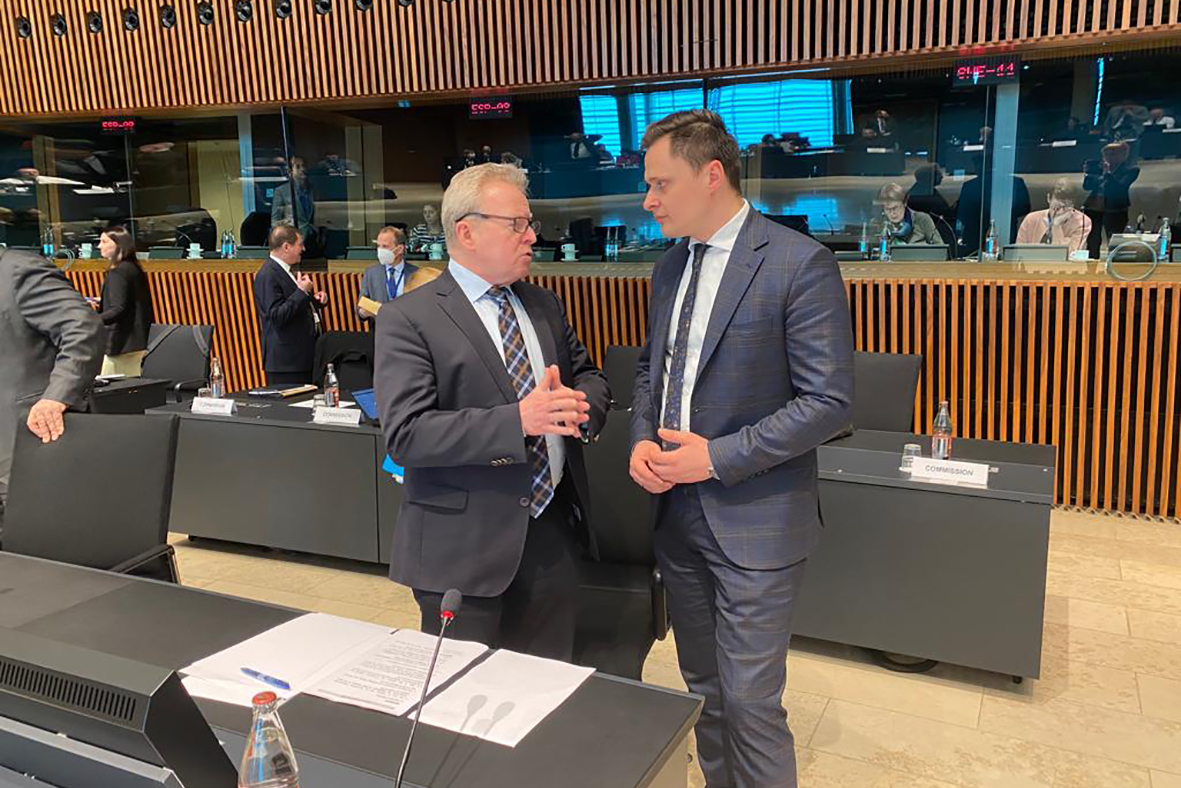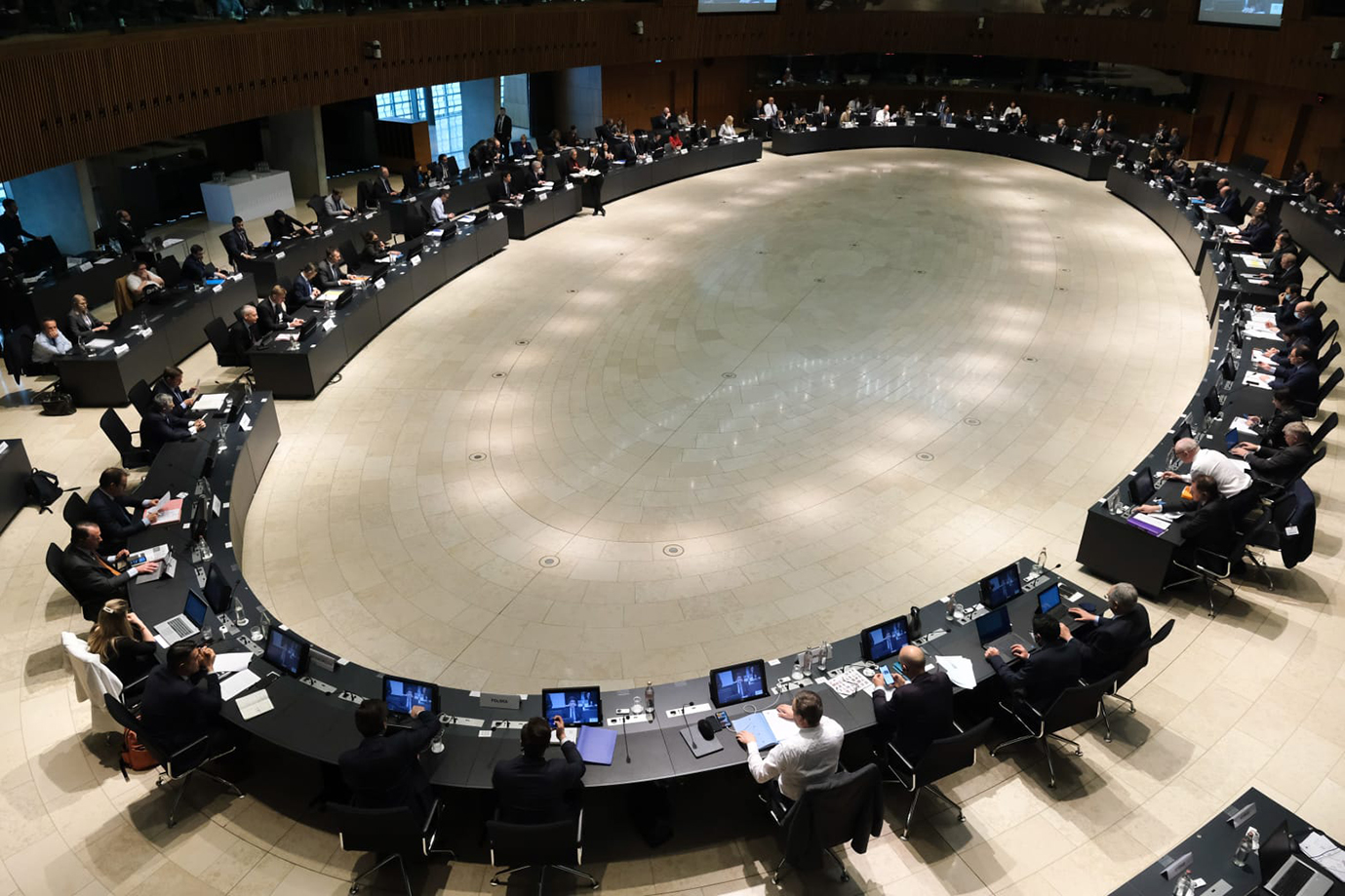The meeting of the EU Agriculture and Fisheries Council
07.04.2022
Undersecretary of State Krzysztof Ciecióra participated in the meeting of the EU Agriculture and Fisheries Council which took place in Luxembourg.

The most important topics of the meeting included the agricultural aspects of the revision of the land use, land use change and forestry (LULUCF) Regulation, safeguarding food security and reinforcing the resilience of food systems, as well as the situation on the agricultural markets.
The Ministers also approved the Council Conclusions on carbon farming.
Revision of the LULUCF Regulation – the agricultural aspects
As part of the item concerning the agricultural aspects of the revision of the LULUCF Regulation (the “Fit for 55” package), Deputy Minister Ciecióra stressed that it was necessary to ensure the equitable treatment of the Member States and to take into account the specific conditions of the agriculture and forestry in each country. He also informed that Poland had serious doubts as to whether the combination of the sectors of agriculture and forestry into one sector (AFOLU) would be safe for both sectors. This would mean the need to limit the animal production in Poland and in the EU and could cause an increase in food imports from third countries which do not implement so ambitious climate targets.
Food security
The Ministers became acquainted with the Communication from the Commission on safeguarding food security and reinforcing the resilience of food systems. The EC pointed out the role of the EU and the measures to ensure the food security of Ukraine itself and at the global level, too, particularly, with regard to the countries of Africa and Middle East.
Referring to an increase in the production capacity of agriculture, the EC announced that it would continue to monitor the impacts of the Farm to Fork Strategy and the Biodiversity Strategy. In the Commission’s view, in the long term there is no need for moving away from the objectives of the European Green Deal. In turn, in the short term, the EC responds to the needs, as demonstrated by the short-term derogation from the obligation to set aside land in EFA areas. Referring to high fertiliser prices, Commissioner Wojciechowski noted that until then only one Member State (Poland) had submitted an application for state aid in this area. He encouraged other Member States to take similar measures.
During their discussion, the Ministers generally positively received the EC Communication and concurred with the main conclusions arising from it. They emphasised the need to safeguard food security, the numerous challenges facing the EU agricultural sector and the high production costs, in particular, those of fertilisers and feeds. They pointed out the need to ensure a good balance between the food security objectives, the adequate food production level in the EU and the Green Deal objectives.
Undersecretary of State Krzysztof Ciecióra expressed the opinion that we faced the most serious humanitarian crisis in Central and Eastern Europe since the end of Wold War Two and, thus, the greatest threat to global food security. The challenges include diminishing the dependence of the EU on imports of energy, fertilisers and certain feedstuffs and reducing the production costs for farmers.
“We must take this situation into account in the assessment of the Strategic Plans. It is also necessary to renew for another year the derogation enabling production to be carried out on land set aside as part of a conditionality,” Deputy Minister Ciecióra said. He also referred to the issue of increasing the capacity to produce plant protein which had been raised by Austria. He pointed out the need for the measures in this area to be coordinated at the EU level.
As part of this item of the agenda, the Ministers also discussed the common document drawn up by Bulgaria, Croatia, Cyprus, Greece, Italy, Latvia, Poland, Portugal, Romania, Slovakia, Slovenia and Spain on the need for an exceptional temporary support measure under the European Agricultural Fund for Rural Development (EAFRD) in response to the unprecedented crisis and its impact on agricultural production systems and food security.
The situation on the market
As part of the item concerning the situation on the agricultural markets, in particular, following the invasion of Ukraine, the Ministers heard a statement by Mr. Mykola Solskiy, the Minister of Agriculture of Ukraine, who expressed gratitude for assistance for refugees and the actions taken until then to support Ukraine and its agricultural production and also called for further support.
Subsequently, the EC presented basic information on the developments on the main agricultural markets in the EU. It stressed that due to farmers and the CAP the EU food safety was not at risk. However, there are essential problems. One of them is the dependence on imports of oil plants, feedstuffs, fertilisers and gas. Others include high production costs, particularly, in the animal sector. Problems also affect the fruit and vegetable sector.
During their discussion, the Ministers above all pointed out very high production costs which were only to a slight extent compensated for by growing prices of agricultural products.
Presenting Poland’s position, Deputy Minister Krzysztof Ciecióra stressed that the situation on the agricultural markets was difficult. This is mostly a result of the unpredictability of the prices of agricultural products and the prices of inputs to agri-food production. Concerns are growing about the continuity of energy supplies, including fuels. The shortage of labour is also increasingly strongly felt. All of these factors have an adverse effect on the costs of production and distribution and enhance the risk of lower viability of the agri-food sector. They also reduce the investment capacity of food supply chain operators.
Among the specific problems, the Polish Deputy Minister mentioned the high prices of cereals, rapeseed, meat and milk, the growing costs of both plant and animal production, the lack of access to selected feedstuffs imported from Ukraine, large disturbances on the market of dessert apples and problems in the bakery industry.
“In light of large instability and concerns about the availability and prices of production inputs, agricultural raw materials and food, there is a need for continuous monitoring of developments and the readiness to take quick action at EU level in the scope of support for agricultural producers and market interventions,” Secretary of State Krzysztof Ciecióra stressed.


